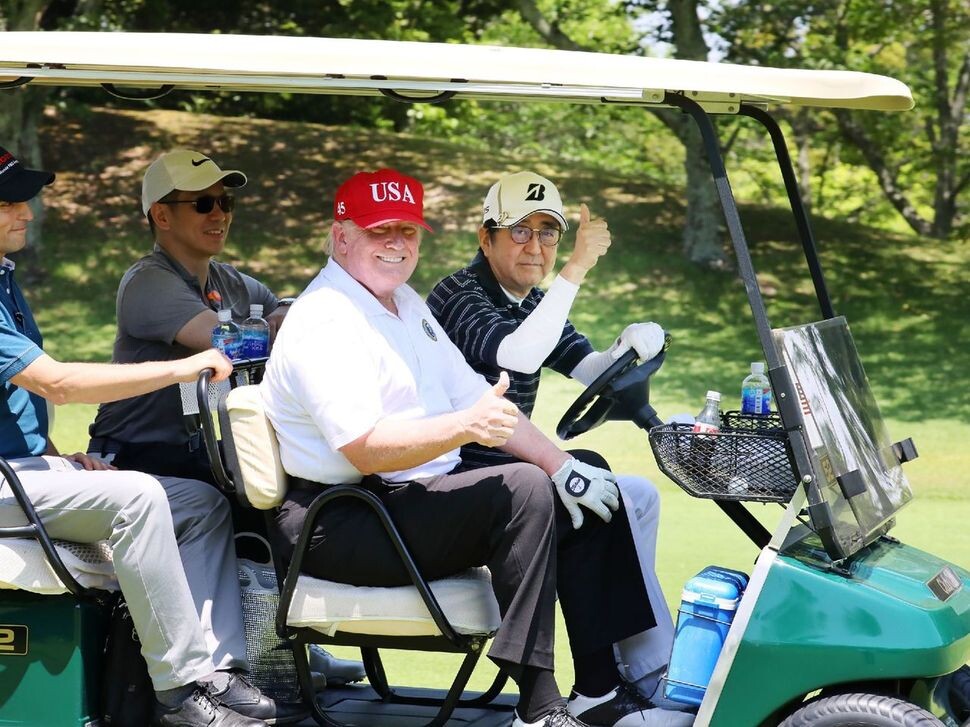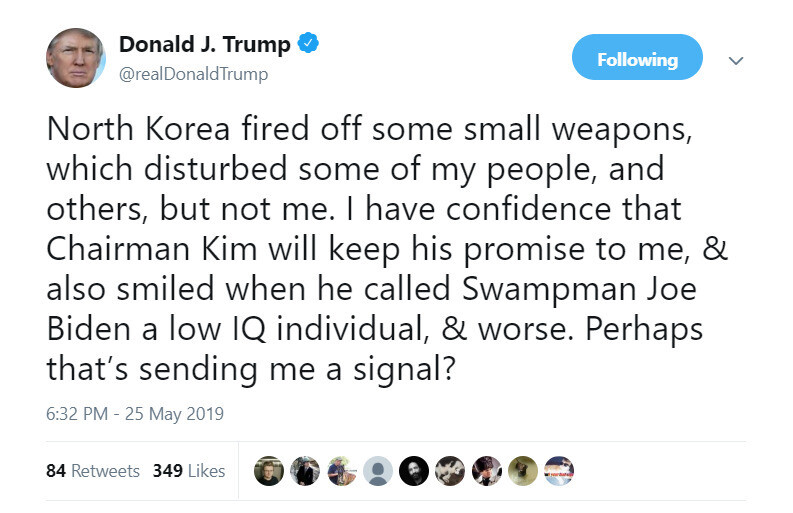hankyoreh
Links to other country sites 다른 나라 사이트 링크
Trump says he’s “not bothered” by N. Korea’s short-range missiles

On May 26, US President Donald Trump remarked that he wasn’t bothered by North Korea’s launch of missiles earlier this month and that he was confident that North Korean leader Kim Jong-un would follow through on his promise to denuclearize. The day before, White House National Security Advisor John Bolton, one of the fiercest hawks among Trump’s aides, had pressured North Korea by describing its missile launches as a violation of UN Security Council resolutions. By publicly disagreeing with Bolton, Trump once again conveyed a conciliatory message to North Korea.
“North Korea fired off some small weapons, which disturbed some of my people, and others, but not me,” Trump tweeted on the morning of May 26, the second day of a four-day state visit to Japan.
“I have confidence that Chairman Kim will keep his promise to me,” Trump also said.
With the tweet, Trump referred to the short-range missiles fired by North Korea on May 4 and 9 as “small weapons” and once again called on the North to keep its promise to denuclearize and halt nuclear weapon and missile tests, a promise it made during the North Korea-US summit in Singapore in June 2018.

Trump rounded off his tweet by saying he’d “also smiled when [Kim] called Swampman Joe Biden [the main presidential candidate in the Democratic Party] a low IQ individual, & worse. Perhaps that’s sending me a signal?” After Biden, former US vice president, called Kim a “dictator,” North Korea’s state-run Korean Central News Agency (KCNA) retorted that Biden had been mocked for having a low IQ after he announced he was running for president.
Trump’s remark about “some of my people” in his tweet is assumed to refer to John Bolton. While talking about North Korea’s missile launch in Tokyo on May 25, Bolton said, “The UN Security Council resolution prohibits the launch of any ballistic missiles and there is no doubt that North Korea has violated the resolution.” That was the first time that a senior official in the US government publicly defined North Korea’s projectiles as “short-range ballistic missiles” and said that they were a violation of UN Security Council resolutions.
When asked about North Korea’s request for the US to return the Wise Honest, a North Korean cargo ship that it has seized, Bolton said, “Maybe now is an appropriate time to talk about the return of the USS Pueblo,” referring to a ship captured by North Korea in 1968.
Trump’s message is thought to be an attempt to counter Bolton’s hardline remarks. Accepting Bolton’s remarks would appear to contradict Trump’s repeated claim that North Korea’s halting its nuclear weapon and missile tests is one of his signature achievements. On May 10, Trump said that some of the projectiles filed by North Korea had been short-range missiles and that some hadn’t been missiles at all, adding that he didn’t regard that as a violation of trust.
What’s interesting is that the discord between Trump and Bolton, a leading architect of the Trump administration’s hardline policy toward North Korea, has been brought into the open. US media outlets have reported that Trump has been unhappy lately with the extremely hardline stance that Bolton has taken on North Korea, Iran, and Venezuela. The Washington Post said that Trump’s tweet was a direct reprimand of Bolton, designed to weaken him and to reset his strident remarks. Trump’s message is also likely to offer some guidelines to Japan, which has been wanting to strengthen pressure on the North, leading up to Trump’s summit with Japanese Prime Minister Shinzo Abe on May 27.
US State Department still open to constructive dialogue with North Korea
When asked to comment on the North Korean Foreign Minister’s statement that North Korea-US dialogue cannot resume until the US comes up with a new calculation, the US State Department said on May 24 that Trump has made clear that he is open to negotiations. After mentioning the terms of the agreement reached by Trump and Kim in Singapore – namely, resetting North Korea-US relations, building a permanent peace regime, and achieving complete denuclearization – the State Department said that the US is still prepared to engage in constructive dialogue with North Korea to achieve simultaneous and parallel progress toward those goals.
“Simultaneous and parallel” was a concept mentioned by US State Department Special Representative for North Korea Stephen Biegun during a speech at Stanford University prior to the North Korea-US summit in Hanoi in February. Even after the US reverted to its demand for an all-in-one deal during the summit, held on Feb. 28, causing the negotiations to break down, the South Korean government has said that it shares the
By Hwang Joon-bum, Washington correspondent
Please direct comments or questions to [english@hani.co.kr]

Editorial・opinion
![[Column] Season 2 of special prosecutor probe may be coming to Korea soon [Column] Season 2 of special prosecutor probe may be coming to Korea soon](https://flexible.img.hani.co.kr/flexible/normal/500/300/imgdb/original/2024/0426/3317141030699447.jpg) [Column] Season 2 of special prosecutor probe may be coming to Korea soon
[Column] Season 2 of special prosecutor probe may be coming to Korea soon![[Column] Park Geun-hye déjà vu in Yoon Suk-yeol [Column] Park Geun-hye déjà vu in Yoon Suk-yeol](https://flexible.img.hani.co.kr/flexible/normal/500/300/imgdb/original/2024/0424/651713945113788.jpg) [Column] Park Geun-hye déjà vu in Yoon Suk-yeol
[Column] Park Geun-hye déjà vu in Yoon Suk-yeol- [Editorial] New weight of N. Korea’s nuclear threats makes dialogue all the more urgent
- [Guest essay] The real reason Korea’s new right wants to dub Rhee a founding father
- [Column] ‘Choson’: Is it time we start referring to N. Korea in its own terms?
- [Editorial] Japan’s rewriting of history with Korea has gone too far
- [Column] The president’s questionable capacity for dialogue
- [Column] Are chaebol firms just pizza pies for families to divvy up as they please?
- [Column] Has Korea, too, crossed the Rubicon on China?
- [Correspondent’s column] In Japan’s alliance with US, echoes of its past alliances with UK
Most viewed articles
- 1AI is catching up with humans at a ‘shocking’ rate
- 2After election rout, Yoon’s left with 3 choices for dealing with the opposition
- 3[Column] Season 2 of special prosecutor probe may be coming to Korea soon
- 4No good, very bad game for Korea puts it out of Olympics for first time since 1988
- 5Korea’s 1.3% growth in Q1 signals ‘textbook’ return to growth, says government
- 6Is Japan about to snatch control of Line messenger from Korea’s Naver?
- 7[Column] Park Geun-hye déjà vu in Yoon Suk-yeol
- 8Division commander ordered troops to enter raging flood waters before Marine died, survivor says
- 9Marriages nosedived 40% over last 10 years in Korea, a factor in low birth rate
- 10‘We must say no’: Seoul defense chief on Korean, USFK involvement in hypothetical Taiwan crisis